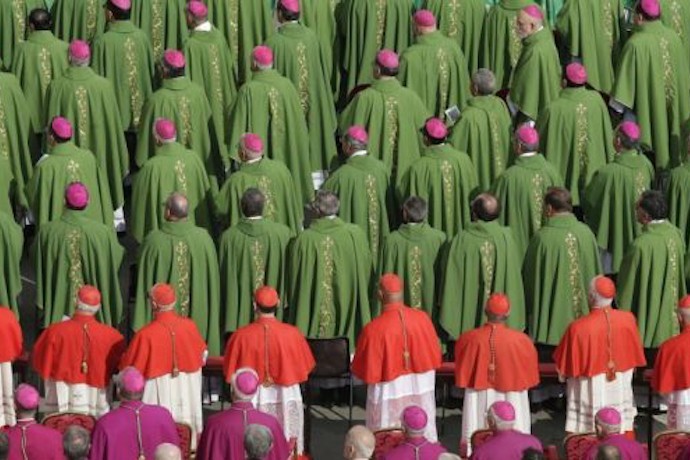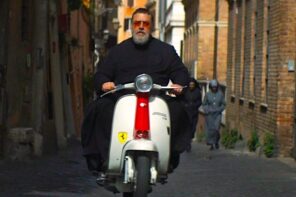Now that Pope Francis has concluded his historic US visit, all eyes turn to Rome for the second part of the Synod of Bishops on family life. Opening the synod yesterday, Francis demonstrated the challenge before the bishops, calling for a church that acts as a “bridge,” not a “roadblock” to people who have erred, but also saying the church must hold fast to Catholic teaching that is not “changed by passing fads or popular opinions.”
The first part of the synod last year quickly became contentious over Francis’ call to extend mercy to those who have fallen short of Catholic teaching, particularly over the issues of how communion should be extended to divorced Catholics who had remarried, and how welcoming the church should be to those in no non-sanctified relationships, such as unmarried and LGBT couples.
It should come as no surprise, then, that a vigorous effort was underway to spin the synod long before it began. Conservatives have been arguing that last year’s synod, which produced unexpectedly lenient recommendations regarding gay, cohabitating and divorced Catholics in its interim report, was manipulated by progressive bishops and doesn’t reflect church teaching. In his book The Rigging of the Vatican Synod, reporter Edward Pentin, who writes for the conservative National Catholic Register, examines the possibility that “key leaders of the recent Extraordinary Synod of Bishops tried to manipulate the outcome to support a change in Catholic practice and perhaps in Catholic teaching on divorce, remarriage and same-sex relationships.” According to Pentin:
Pope Francis called for an open and free debate in a bid to help the Church rise to the pastoral challenges facing marriage and the family today, but the dramatic two-week meeting was marred by allegations of manipulation, lies, and dirty tricks.
Pentin’s book is long on accusations and short on findings that any actual manipulation took place outside of the expected machinations of Vatican politics, which were unusually public due to a hotbed of a media environment. There was a contentious relationship between synod officials and some of the conservative bishops over the administration of the synod, which differed from past synods in both the level of transparency as well as less reliance on formal, written statements submitted ahead of time from bishops. There was also robust internal debate over doctrine and pastoral practice:
Critics of the synod say a key means of manipulation was for the synod managers to reiterate frequently that doctrine was not going to be touched during the synod, but it was possible to change pastoral practice to reflect today’s realities. … The new practices, it was claimed, simply fit better with the current situation of many people in the Church.
But that wasn’t manipulation—it was the key purpose of the synod and the question Francis asked it to address. Most of what conservatives term “manipulation” was newly empowered progressive bishops pushing for change, something they hadn’t had to deal with in the Vaticans of Popes John Paul II and Benedict XVI, where synod outcomes were largely predetermined and in line with Vatican orthodoxy.
Also pushing back on the suggestion that the church must, or can, evolve on pastoral practice is a book from a group of conservative cardinals. The pithily titled Eleven Cardinals Speak on Marriage and the Family: Essays from a Pastoral Viewpoint, makes that argument that Catholic practice regarding divorce can’t change because, well, it’s always been that way.
German Cardinal Paul Josef Cordes argues that:
anyone who goes around the parishes saying that the long-sought-after ‘loop-hole of mercy’ [for divorced Catholics] has been found has shut his eyes to the aforementioned dead ends in Church history or else he is pretentiously self-confident: as though today suddenly such an ingenious theological insight had been discovered that it would open up a path that had been blocked for two thousand years.
He knocks the proponents of change—most notably his German bishop colleagues—as “brimming with self-confidence, like men on a mission,” and says they “can be assured of the applause of the media,” but concludes that “any careful and thoughtful observer will be skeptical about their suggestions.”
Dutch Cardinal Willem Jacobus Eijk writes that it would be impossible to extend communion to divorced and remarried Catholics because a second civil marriage is “not, in fact, another marriage, but a form of structured and institutionalized adultery.”
Tellingly, Eijk delves into the heart of conservative’ fears regarding any liberalization regarding marriage, saying that if the church were to suggest that marriage was not indissoluble:
[W]e would also be agreeing that the mutual gift of the spouses did not have to be total, either at the spiritual or at the physical level. Consequently, we would be compelled to change the Church’s doctrine about marriage and sexuality in other areas.
It’s in this “slippery slope” argument that conservatives most differ from Francis. He clearly sees a way to offer some pastoral leniency for “whoever knocks in search of help and support,” while maintaining traditional church teaching. Yesterday he spoke at length of the central importance of traditional marriage and reaffirmed the “unity and indissolubility of the conjugal bond” and the “true meaning of the couple and of human sexuality in God’s plan.”
Progressives also made their arguments ahead of the synod. In Catholic Women Speak: Bringing Our Gifts to the Table, 43 Catholic women, including prominent theologians such as Sister Elizabeth Johnson and Sister Margaret Farley, write about the exclusion of women from the synod and “the messy realities of women’s lives, realities that challenge the Church’s current practice in many ways, realities that the Church must acknowledge in order to communicate the Gospel to future generations.”
“The absence of women’s perspectives at times of reflection on these issues is not only an act of disdain toward women, who make up more than half of religious and believers, it is also an impoverishment of Catholic life,” writes Lucetta Scaraffia, who will be at the synod, like other women attendees, as a nonvoting auditor.
But the reality is for all the fuss likely to be made about the synod, it will cover only a very narrow patch of ground on the most contentious issues facing the church. Writing in the New York Times, retired Bishop Francis Quinn argues that for the church to be truly renewed, especially among increasingly disaffiliated young Catholics, it must consider not only a pastoral path to communion for divorced Catholics, but also accepting married and women priests—two issues that aren’t even on the table.
Thirty-five years ago, however, at the last family synod called by a pope, Quinn argued for a pastoral path to contraception use by married couples within a doctrine of “responsible parenthood.” He was silenced by the Vatican and forced to recant his suggestion. Now contraception use, which many argue is at the heart of the church’s lack of credibility with the laity, isn’t on anyone’s agenda.





